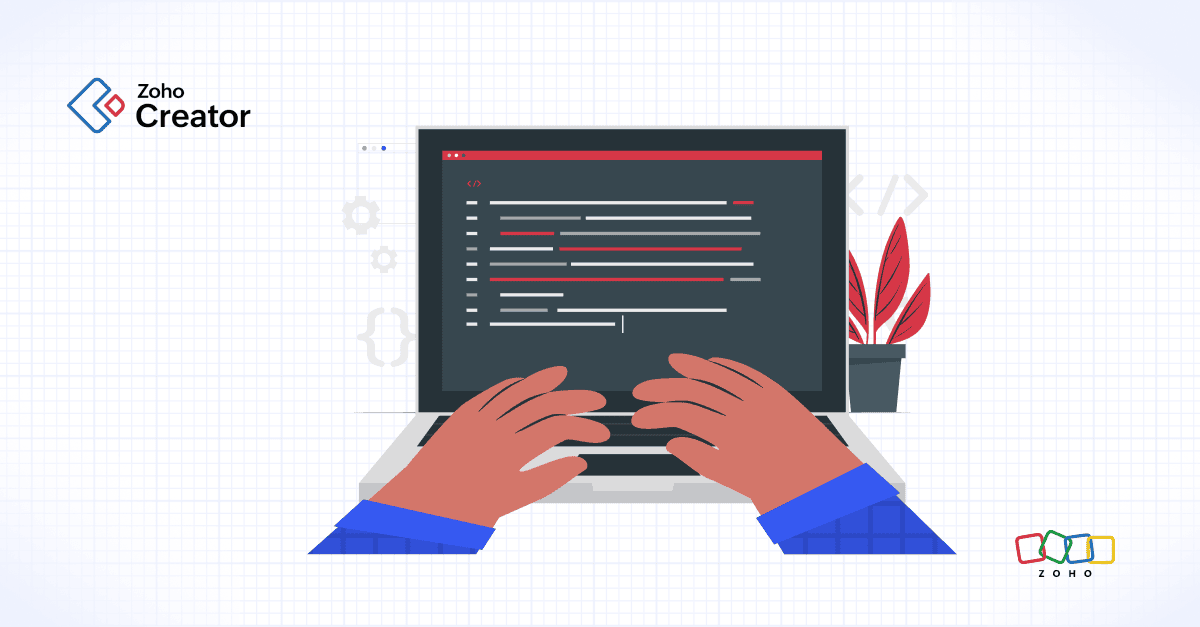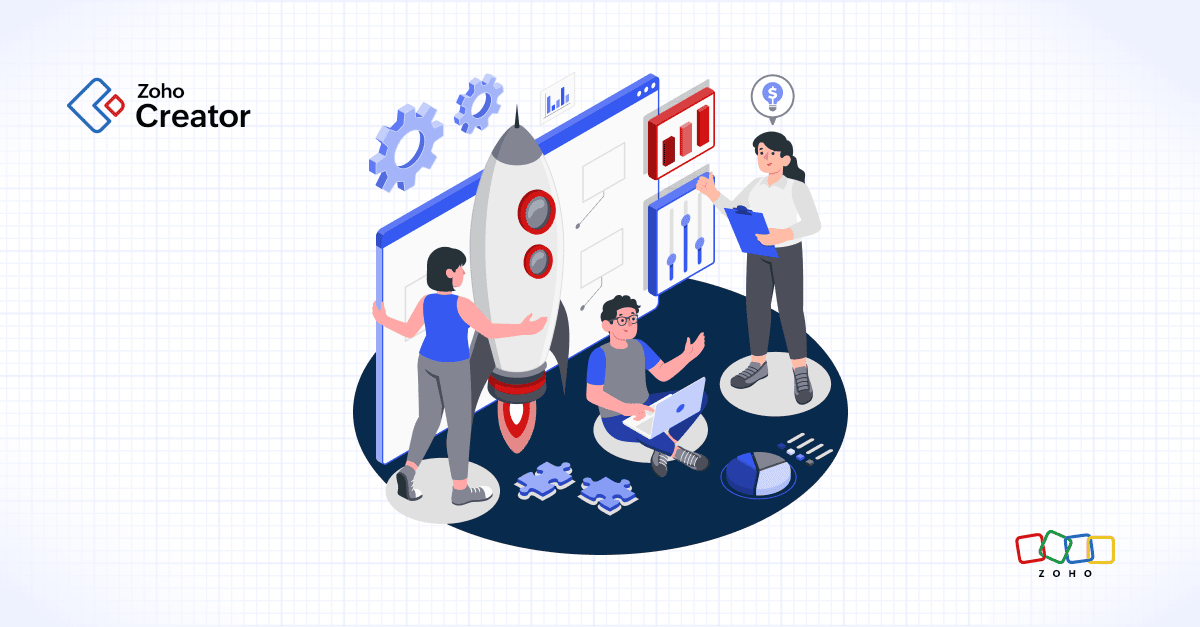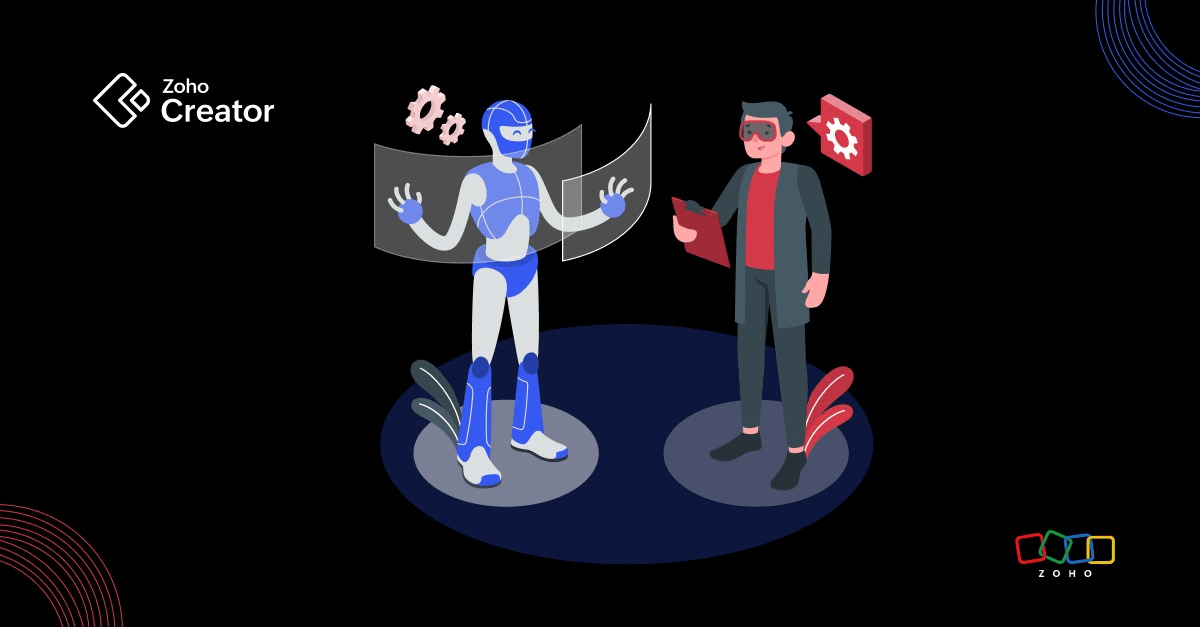- HOME
- Know Your Tech
- How AI is reducing time-to-market in custom app development
How AI is reducing time-to-market in custom app development
- Last Updated : July 28, 2025
- 415 Views
- 10 Min Read
TL;DR: Traditional app development can’t keep up with today’s speed of business, as long timelines and manual processes often delay launches. AI-accelerated app development changes that by automating code generation, testing, and even design tasks. Generative AI, NLP, and machine learning help turn ideas into working apps faster—reducing errors, optimizing workflows, and improving team productivity. From smarter prototyping to predictive resource planning, AI shortens time to market while enhancing quality. Though it comes with challenges like integration and training, the payoff is faster, more efficient custom app delivery that keeps you ahead of the curve.
Businesses today are expected to deliver custom applications quickly to stay competitive, support customers, and improve operations. But traditional development often moves too slowly. Long timelines, high costs, and constant coordination slows down progress; and by the time the app is ready, the opportunity may already be gone.
But AI-accelerated app development offers a more innovative way forward. It automates time-consuming tasks like coding, testing, and even project management. This helps you deliver working applications faster, using smaller teams and with fewer delays.
According to McKinsey, 78% of organizations now use AI in at least one business function. That shows just how quickly AI is becoming a standard tool for speed and efficiency.
In this blog post, we'll explore how AI can reduce your time to market in custom app development, save valuable resources, and help your business move faster.
What is AI-accelerated app development?
AI-accelerated app development uses generative AI to make building software faster, smarter, and less dependent on manual effort. Instead of writing every line of code or building every feature from scratch, developers use AI tools to generate code, automate tasks, suggest features, and even test applications.
These tools primarily rely on GenAI, which offers a more dynamic and intuitive approach to development. Developers just have to provide natural language prompts that the AI uses to create code, shifting the process from traditional debugging to more experimental and iterative methods. The focus is on collaborating with the AI, allowing it to generate suggestions and improve the software over time.
By reducing manual coding and embracing AI's input, generative AI speeds up development, automates workflows, and ultimately shortens time to market.
Core technologies
AI-accelerated app development utilizes a range of advanced technologies that enhance the app development process by making it smarter, faster, and more efficient. These technologies automate complex tasks, simplify workflows, and deliver better results with fewer resources.
Here’s how each of these key technologies contributes to improving the app development lifecycle:
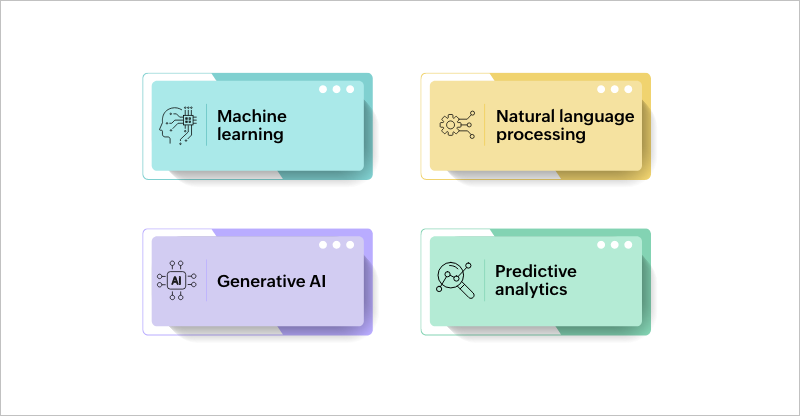
Machine learning (ML): Automates decision-making by analyzing data patterns, allowing apps to adapt to real-time changes without manual adjustments
Natural language processing (NLP): Converts business requirements into executable code, reducing manual coding and speeding up development
Generative AI: Automatically generates code snippets and app modules, accelerating prototyping and feature creation
Predictive analytics: Uses historical data to forecast trends, optimize resources, and align app features with market demands
With a solid understanding of the technologies at play, let's now look at the key benefits these AI tools bring to the table.
Benefits of AI-accelerated app development
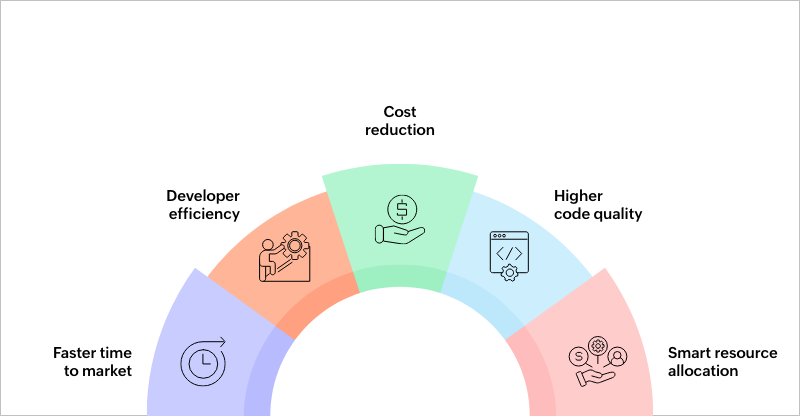
Integrating AI into the app development process offers several advantages, directly contributing to faster, more innovative, and more cost-effective application creation. Here's how:
Faster time to market: AI automates tasks like code generation and testing, enabling quicker launches and faster responses to market changes.
Increased developer productivity: AI handles repetitive tasks, freeing developers to focus on more complex and innovative work.
Cost reduction: Automation reduces the need for large teams, lowering operational costs and allowing resources to be reallocated.
Higher code quality: AI-driven testing tools catch bugs early, ensuring a reliable, bug-free final product.
Smarter resource allocation: Predictive analytics help optimize team workloads and allocate resources more efficiently.
Although the benefits are significant, businesses should also consider the potential challenges of implementing AI in custom app development.
Challenges in implementing AI in custom app development
While AI can greatly enhance app development, integrating these technologies presents challenges. From technical limitations to data quality concerns, businesses must address several obstacles to ensure successful AI implementation:
Skills and training: Development teams may require training to effectively use AI tools, which could involve time and investment.
Data quality and availability: AI needs clean, structured data to function correctly. Without high-quality data, results may be inaccurate.
Integration with legacy systems: AI tools may face compatibility issues with existing systems, adding complexity to the integration process.
Security and privacy: AI apps must adhere to privacy regulations like GDPR and HIPAA, ensuring strong security to protect sensitive data.
Despite these challenges, the ability of AI to accelerate development is undeniable. Let's see how AI can speed up time to market for custom app development.
How does AI accelerate custom app development?
Through the use of GenAI, app development becomes faster, smarter, and less dependent on manual effort. By using AI-driven tools, the process is simplified, reducing the need for manual input, shortening development cycles, and ensuring quicker delivery of fully functional custom applications. This approach not only reduces time to market but also leads to more accurate and high-quality outcomes with fewer resources:
AI in prototyping and design
The prototyping and design phase is often one of the most time-consuming aspects of app development. AI helps you simplify this phase by automating design creation and providing intelligent, real-time feedback.
1. Automated prototyping
AI-driven tools, particularly those using generative adversarial networks (GANs), can convert business requirements into fully functional app prototypes in real time.
These generative algorithms create multiple design iterations based on input, offering optimized user experiences by analyzing user behavior, industry best practices, and even historical data from previous designs.
For instance, AI can automatically adjust UI/UX design elements like button placements or navigation flow, based on predictive user interaction models, dramatically reducing manual design work.
2. Real-time feedback
AI tools constantly analyze your designs against large datasets of successful applications, providing real-time insights for improvements.
These suggestions might include changes to color schemes, font sizes, and visual layouts, based on user preferences or data-backed insights from millions of app designs.
For example, AI can recommend design modifications to enhance accessibility for users with disabilities, a process that would take designers much longer without AI assistance.
By automating prototyping and providing actionable feedback, AI accelerates the design phase, enabling you to move faster into the development stage.
AI in code generation and testing
The coding and testing phases are often where delays occur, but AI is enhancing these stages by automating code generation and speeding up the testing process.
1. Natural language to code
AI tools like GitHub Copilot and Tabnine use advanced natural language processing (NLP) to translate business requirements written in plain language into executable code.
For example, you could describe a feature such as "create a user login system," and the AI will automatically generate the necessary backend logic, APIs, and database integration code.
These tools are trained on massive datasets from open-source codebases, enabling them to produce optimized code snippets quickly. Not only does this reduce the time developers spend writing repetitive code but it also ensures best practices are followed by generating secure, efficient code.
2. Automated code optimization
AI doesn't just generate code; it also optimizes existing code. Tools powered by generative AI analyze the performance and efficiency of your code, suggesting improvements.
For instance, AI can detect and refactor inefficient algorithms, point out memory leaks, or recommend changes that improve scalability and response times. This automatic optimization reduces the need for manual code reviews and ensures that your app is fast and resource-efficient.
3. Automated testing
AI-driven testing tools such as Selenium, Appium, and Test.ai take over creating test cases, bug detection, and regression testing. These tools simulate real-world user interactions and identify potential issues that human testers might overlook.
AI can automatically generate comprehensive test suites that adapt to any changes in the app, testing across multiple devices, operating systems, and browsers. It can even predict new edge cases based on past testing data and user behavior analytics.
AI's ability to run regression tests faster is a key benefit of testing. Whenever a new feature is added or updated, AI systems automatically run a full suite of tests, ensuring nothing else breaks.
4. Boosted development speed
AI tools like GitHub Copilot help developers complete tasks more quickly than traditional methods. By automating code generation and testing, AI allows your team to focus on more complex tasks, ultimately accelerating the overall development cycle.
AI-powered code generation and testing tools help you get to a fully functional product faster, with fewer bugs and more efficient code.
AI in workflow and resource optimization
Effective resource allocation and task automation ensures that development progresses smoothly and on schedule. AI helps you manage both more efficiently.
1. Task automation
Routine coding tasks, like refactoring, formatting, and documentation generation, are often time-consuming but can be automated by AI.
For instance, Mutable.ai and Qodo can generate documentation directly from the code itself, ensuring that developers don't have to spend additional time writing it manually.
Additionally, AI can handle tasks like optimizing database queries or suggesting better ways to structure code, so your team spends more time on value-adding activities like feature development and debugging.
2. Smart resource allocation
Predictive AI models analyze historical data from similar projects to forecast resource requirements, ensuring optimal team allocation.
These tools dynamically allocate tasks based on the team's skill sets, available bandwidth, and real-time project demands, ensuring no wasted resources.
By proactively predicting delays and adjusting workloads, AI helps keep the project on track, avoiding bottlenecks and ensuring that critical tasks are completed on time.
3. Optimizing developer workflows
AI can analyze team performance and suggest optimal task sequencing, allowing teams to avoid roadblocks and delays.
Tools like Jira, integrated with AI, can predict project delays, suggest workflow optimizations, and proactively reassign tasks to keep everything moving on schedule.
These tools also provide insights into team dynamics, helping you make smarter decisions about project management and resource usage.
AI's resource management tools allow you to optimize workflows, allocate resources smartly, and automate repetitive tasks, ensuring your app development is always on track.
Types of AI-powered development platforms
Developing a custom app with AI starts by selecting the right tools. Choosing the right platform will depend on your team's skills, project requirements, and timeline. Thankfully, AI-powered development software simplifies the process, speeds up builds, and maintains flexibility.
Low-code/no-code platforms
Low-code/no-code platforms, such as Zoho Creator, utilize visual interfaces and drag-and-drop components, enabling both developers and business users to build applications with minimal coding. What distinguishes Zoho Creator is CoCreator, its AI assistant powered by Zoho's GenAI and OpenAI. CoCreator enhances the app development process by:
Understanding your idea: Users can describe their needs and upload wireframes, and CoCreator generates a complete app with relevant features.
Contextual component suggestions: CoCreator suggests fields and components to ensure thorough data capture based on your requirements.
Automated workflows: It builds workflows and business processes with relevant stages and transitions, ready for customization.
Integration with existing apps: CoCreator recommends integrations with your current apps for seamless data flow.
Code generation and optimization: Users provide problem statements, and it generates or optimizes usable code for better efficiency.
Personalized design: It generates customized icons and themes that reflect your business objectives.
Data import and cleansing: CoCreator organizes data, resolves inconsistencies, and standardizes formats.
Simplified data modeling: It maps out data models and identifies relationships, simplifying data structuring.
AI-powered development tools
These tools assist developers by generating code snippets, automating testing, and offering real-time suggestions, improving overall efficiency.
Pro-code solutions
For complex projects, combining traditional coding with AI tools helps developers maintain complete control while automating repetitive tasks like code generation and testing.
Future implications of AI in custom app development
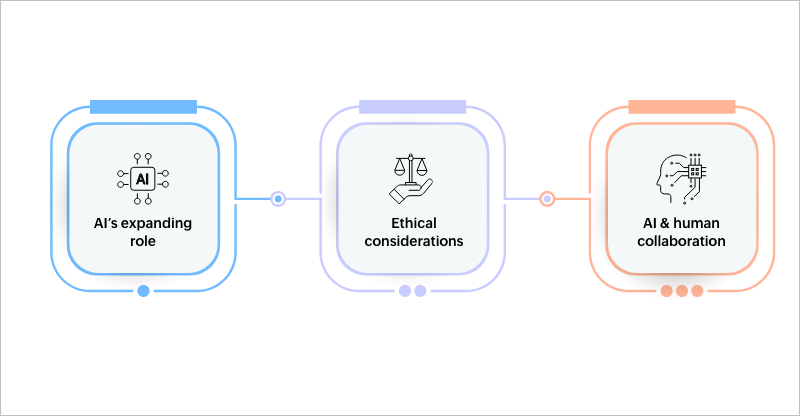
As AI continues to evolve, its integration into custom app development will bring both significant opportunities and challenges. Key areas to consider include AI's growing role, ethical concerns, and the evolving relationship between AI and human developers.
AI's expanding role: AI tools are becoming essential, with 76% of developers already using or planning to use them.
As these tools become more advanced, we can expect AI to assist in areas like architecture recommendations, performance tuning, and automated testing. This shift will likely reshape how custom applications are planned, built, and maintained.
Ethical considerations: Issues like algorithmic bias, data privacy, and transparency need urgent attention as AI systems become more complex.
AI and human collaboration: The future lies in enhancing human capabilities through AI, creating a productive, symbiotic relationship.
As AI continues to evolve, balancing innovation with ethical oversight and collaboration between AI and human developers will shape the future of custom app development.
AI’s impact on faster custom app development
The pressure to launch apps quickly without compromising quality is a significant challenge for businesses today. Traditional app development processes are slow, resource-heavy, and often fall short of meeting market demands. But AI-accelerated app development addresses these issues, significantly reducing development time and enabling faster responses to market needs.
Zoho Creator provides the perfect solution for these challenges. With its low-code and AI-powered capabilities, it lets businesses build custom applications quickly, automating workflows and reducing reliance on IT teams. It helps you bring your ideas to life faster, simplifies the process, and drives business growth.
FAQ
1. How does AI-accelerated app development impact the overall user experience of the app?
AI tools can optimize user interfaces by analyzing user behavior and preferences, ensuring that app features are intuitive and highly responsive. Automated testing and real-time feedback also helps refine the app’s design and functionality, ultimately delivering a more seamless and user-friendly experience.
2. What are the costs involved in adopting AI for app development?
While adopting AI tools may require an upfront investment in training and software, the long-term benefits, such as faster development cycles and reduced operational costs, far outweigh the initial costs. AI accelerates processes, reducing the need for large development teams, which can lead to significant savings over time.
3. Can AI-driven app development tools be integrated with existing systems?
Yes, AI tools are designed to integrate with various platforms, including legacy systems. However, businesses may need to assess compatibility and ensure smooth integration by choosing AI-powered platforms that offer flexibility and strong support for system integration.
 Bharathi Monika Venkatesan
Bharathi Monika VenkatesanBharathi Monika Venkatesan is a content writer at Zoho Creator. Outside of work, she enjoys exploring history, reading short novels, and cherishing moments of personal introspection.

